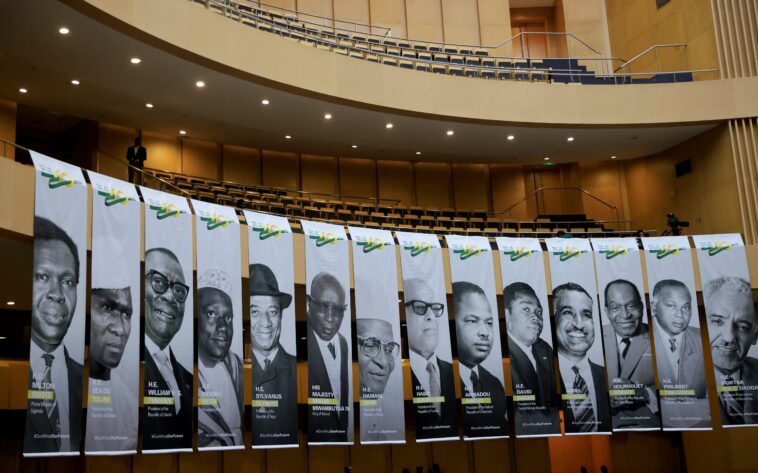The 37th African Union (AU) summit began in Addis Ababa on 14 February with dozens of government delegations jetting in. Heads of state from across the continent will meet from 17-18 February. Several thorny issues already feature on the agenda of this Pan-African reunion.
Member states will discuss ongoing conflicts in Sudan and Libya. But presidents, foreign ministers and government representatives will also tackle a range of political and institutional crises that are rocking the continent.
On the agenda: turmoil sparked by Senegal’s postponed presidential poll, turbulence as the Economic Community of West African States (ECOWAS) prepares for Mali, Burkina Faso and Niger’s exit, and the escalating tensions between Rwanda and Democratic Republic of Congo (DRC).
Successor to Azali Assoumani finally nominated
When not negotiating behind closed doors, presidents will officially appoint Mohamed Ould Cheikh El Ghazouani as AU president, successor to Azali Assoumani of Comoros who was elected in February 2023. An uncertain candidacy long fraught by regional divergence.
As per the AU’s rotation principle, after Comoros and Senegal came North Africa’s turn. Most saw Mauritania’s president as a consensus candidate, yet his nomination dragged on. Bogged down by Algerian-Moroccan tensions and divisive Tunisian and Egyptian leaders, the region struggled to compromise, risking the AU presidency passing to Southern Africa. Barring a last-gasp upset, Mr Ould Cheikh El Ghazouani will take the helm at the AU.
AU wins seat at G20 top table
Looking back over his tenure, Assoumani can boast at least one significant diplomatic victory. Last September, the AU officially joined the G20, gaining a seat beside heavyweights like India and Turkey. Despite lacking the UN Security Council role it craves, the AU can now amplify African voices on the world stage. As plans shape up, the AU head will represent Africa at G20 forums. No surprise then that Brazil’s President Lula, current G20 chair, will guest star at the Addis summit.
West Africa’s political turmoil set to dominate
West Africa’s political upheavals will likely dominate discussions. Mired in an unprecedented crisis since its 1975 creation, the hitherto exemplary ECOWAS, Africa’s most successful integration model, is bracing for the economic fallout of Mali, Burkina Faso and Niger’s withdrawal – announced jointly under a new Sahel States Alliance late January.
Beyond the current crop of junta regimes – who are suspended from the AU – the bloc will scrutinise Senegal’s crisis. President Macky Sall’selection postponement announcement has sparked an unprecedented political crisis, thrusting the erstwhile democratic darling under the spotlight.
Momentum needed to reboot DRC-Rwanda mediation
Also topping the summit agenda: military and diplomatic tensions pitting DRC against Rwanda. Kinshasa charges Kigali with backing M23 rebels whose forces have fought in North Kivu since late 2012. With a brief December ceasefire in tatters, border violence has soared.
As Washington ratchets up pressure on regional allies to find solutions, the Addis platform could revive sputtering mediations – primarily by Angola’s João Lourenço, AU mediator since 2022. Though his July 2022 mediation enabled talks between Paul Kagame and Félix Tshisekedi, ties between both men have since frayed.
Turbulent relations between Kenyatta and his successor William Ruto threaten continued Kenyan mediation efforts
In parallel, Nairobi also endeavours to intercede via former president Uhuru Kenyatta – whose AU summit attendance remains unconfirmed. Yet turbulent relations between Kenyatta and his successor William Ruto threaten continued Kenyan mediation efforts.
Horn of Africa tensions feature
Also under the microscope: diplomatic tensions in the Horn of Africa, inflamed early January by military cooperation talks between Addis Ababa and the separatist Somaliland region, just a week after a maritime agreement.
The partnership, granting landlocked Ethiopia renewed sea access – lost with Eritrea’s 1993 independence – predictably irked Somalia. Mogadishu fiercely contests Somaliland’s unilateral claim to statehood, which is not recognised by the international community.
After 2020 negotiations failed, Somalia and Somaliland are slated to restart talks, following a dialogue agreement signed December 29th under Djibouti’s President Ismael Omar Guelleh.
Understand Africa’s tomorrow… today
We believe that Africa is poorly represented, and badly under-estimated. Beyond the vast opportunity manifest in African markets, we highlight people who make a difference; leaders turning the tide, youth driving change, and an indefatigable business community. That is what we believe will change the continent, and that is what we report on. With hard-hitting investigations, innovative analysis and deep dives into countries and sectors, The Africa Report delivers the insight you need.

